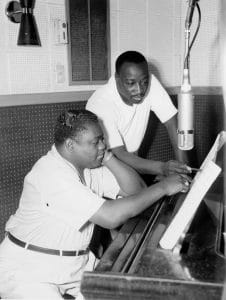A musician, Bartholomew was a master on the trumpet, perhaps because his teacher had also taught another guy: Louis Armstrong. Bartholomew also had his own band, and wrote hit songs for other singers. When he was inducted into the Rock and Roll Hall of Fame, he was cited as a key figure in the transition from jump blues and swing to R&B, one of New Orleans’ greatest musicians, “and a true pioneer in the rock and roll revolution.” How so? After serving in the U.S. Army during World War II, Bartholomew returned to New Orleans and led the band at the Dew Drop Inn, which was a “model for early rock ’n’ roll bands the world over,” says music historian Robert Palmer. After recording for Imperial Records in Houston, Bartholomew was a talent scout for the label in New Orleans. He wrote a song with one piano player he liked: Fats Domino, and “The Fat Man” (which Domino recorded in 1949) is considered one of the first rock records, selling a million copies by 1953. The two went on to write and record many other hits.

“It’s virtually impossible to imagine the New Orleans musical canon without the impact of Dave Bartholomew,” says musician Michael Hurtt. “His devastating influence has charted the course of the city’s jazz, rhythm and blues, rock ’n’ roll, soul and funk sounds for well over 50 years.” Bartholomew “ran a tight ship in the [recording] studio,” says documentarian George Ingmire, who has recorded the oral histories of many New Orleans musicians. “There was no showing up late. There was no drinking. You wouldn’t have the number of hits that Fats Domino and others who recorded at Cosimo Matassa’s studio were it not for that tight ship. There was an enthusiasm and a work ethic that went around. Dave set the tone.” As for his legacy, Hurtt says, Bartholomew “blended country and western chord changes with a driving backbeat, tripleting piano, rocking saxophones and deceptively simply guitar lines,” and “solos, generally taken by either sax or guitar, were loaded with feeling and seemed programmed to snap the listener to attention.” And that, he said, became “the New Orleans sound,” and Bartholomew “liberally built upon it until it was ingrained in the city’s very soul.” Bartholomew died in New Orleans from heart failure on June 23. He was 100.
